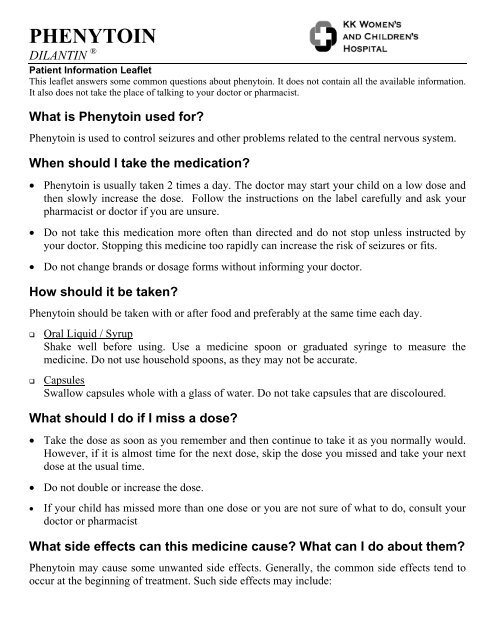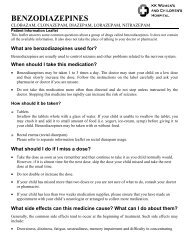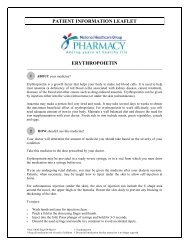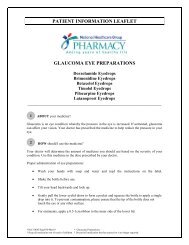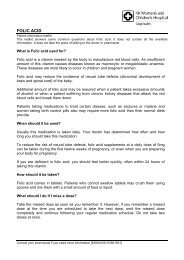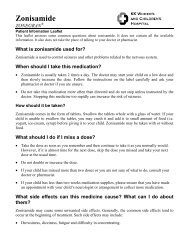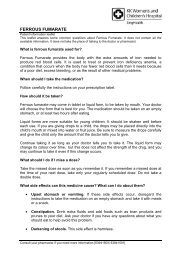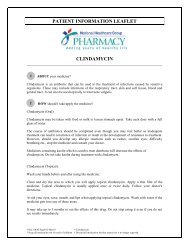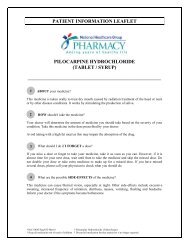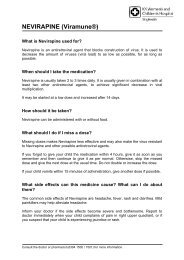INFORMATION ON PHENYTOIN
INFORMATION ON PHENYTOIN
INFORMATION ON PHENYTOIN
Create successful ePaper yourself
Turn your PDF publications into a flip-book with our unique Google optimized e-Paper software.
<strong>PHENYTOIN</strong>DILANTIN ®Patient Information LeafletThis leaflet answers some common questions about phenytoin. It does not contain all the available information.It also does not take the place of talking to your doctor or pharmacist.What is Phenytoin used for?Phenytoin is used to control seizures and other problems related to the central nervous system.When should I take the medication?• Phenytoin is usually taken 2 times a day. The doctor may start your child on a low dose andthen slowly increase the dose. Follow the instructions on the label carefully and ask yourpharmacist or doctor if you are unsure.• Do not take this medication more often than directed and do not stop unless instructed byyour doctor. Stopping this medicine too rapidly can increase the risk of seizures or fits.• Do not change brands or dosage forms without informing your doctor.How should it be taken?Phenytoin should be taken with or after food and preferably at the same time each day.Oral Liquid / SyrupShake well before using. Use a medicine spoon or graduated syringe to measure themedicine. Do not use household spoons, as they may not be accurate.CapsulesSwallow capsules whole with a glass of water. Do not take capsules that are discoloured.What should I do if I miss a dose?• Take the dose as soon as you remember and then continue to take it as you normally would.However, if it is almost time for the next dose, skip the dose you missed and take your nextdose at the usual time.• Do not double or increase the dose.• If your child has missed more than one dose or you are not sure of what to do, consult yourdoctor or pharmacistWhat side effects can this medicine cause? What can I do about them?Phenytoin may cause some unwanted side effects. Generally, the common side effects tend tooccur at the beginning of treatment. Such side effects may include:
• Short-term side effects -o Drowsiness, dizziness, headache, tiredness, insomnia or fatigueBe careful when you are giving your child over-the-counter medicines. Medicines forcold and allergy may add on to the drowsiness. Be sure to supervise your child whenhe/she is involved in activities such as cycling or swimming.Inform your doctor if any of the above side effects lasts for more than a few days or if theybecome serious or bothersome.• Long-term side effects -o Increase hair growth, enlarged lips, coarsening of facial featureso Swelling and irritation of the gumsProper dental care and hygiene may prevent this side effect.If your child experience excessive drowsiness, nausea and vomiting, doubled vision andunstable movement, slurred speech, confusion, please consult your child’s neurologist as he/shemay be too sensitive to phenytoin and may need to adjust his/her dose.Rare but serious effects may sometimes occur. Contact your doctor as soon as possible if younotice any of the following:• Severe skin rash, itchy or peeling skin• Sudden decrease in urination or dark urine• Any unusual signs of bleeding or bruising, prolonged fever, sore throat and mouth sores• Yellowing of skin or eyesInform your doctor if you notice any other unusual symptoms in your child. Always discusswith your doctor or pharmacist if your child has any problems or difficulties during or aftertaking phenytoin.Special instructionsCheck with your doctor or pharmacist if you want to give any other medicines, supplements orherbal products to your child.If your child sees another doctor, inform him that your child is taking Phenytoin before heprescribes any other medications.Consult your doctor or pharmacist (6394 1501 / 1500) if you need more information.Patient information project of Pediatric Neurology Service and Pharmacy


